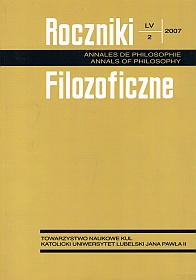Dowód matematyczny z punktu widzenia formalizmu matematycznego. Część I
Abstrakt
This article is the first one to examine the evolution of the notion of mathematical proof in a historical perspective. First I present the intuitive, approach of Descartes, according to which mathematical proof is based on self-evident principles. I follow with an analysis of Berkeley’s mathematical instrumentalism and argue that he can be considered a predecessor of modern formalism. The article also deals with the ideas of Peacock and Pasch, and their role in the development of the modern formalistic viewpoint.
Bibliografia
Bassler O. B. (2006): The surveyability of mathematical proof: a historical perspective, „Synthese” 148, 99-133.
Berkeley G. (2005): Traktat o zasadach ludzkiego poznania, Kraków: Zielona Sowa.
Coffa A. (1986): From Geometry to tolerance: sources of conventionalism in nineteenth-century geometry, [w:] R. Colodny (ed.), From quarks to quasars: Philosophical problems of modern physics, University of Pittsburgh Series, Vol. 7, Pittsburgh: Pittsburgh University Press, 3-70.
Copleston F. (1997): Historia filozofii, tom V. Od Hobbesa do Hume’a, Warszawa: PAX.
Descartes R. (1958): Prawidła kierowania umysłem; poszukiwanie prawdy przez światło przyrodzone rozumu, Warszawa: PWN.
Descartes R. (2002): Rozprawa o metodzie właściwego kierowania rozumem i poszukiwania prawdy w naukach, Kraków: Zielona Sowa.
Detlefsen M. (2005): Formalism, [w:] S. Shapiro (red.), The Oxford Handbook of Philosophy of Mathematics and Logic, Oxford: Oxford University Press, 236-317.
Fallis D. (2003): Intentional gaps in mathematical proofs, „Synthese”, 134, 45-69.
Gray J. (1989): Ideas of Space, Euclidean, Non-Euclidean and Relativistic, wyd. 2, Oxford: Oxford University Press.
Pasch M. (1882): Vorlesungen über neuere Geometrie, Leipzig: Teubner.
Peacock G. (1830): Treatise on Algebra, Cambridge: Deighton; London: Rivington, and Whittaker, Treacher&Arnot.
Copyright (c) 2007 Roczniki Filozoficzne

Utwór dostępny jest na licencji Creative Commons Uznanie autorstwa – Użycie niekomercyjne – Bez utworów zależnych 4.0 Międzynarodowe.





